|
He was five feet three inches tall!
With his fair hair, slim body and light skin, he looked
boyish. He stood before the army medical board
volunteering his services as a soldier. That was in
early 1914. War had broken out between Britain and
Germany and Turkey had sided with Germany. Britain
urgently needed soldiers; but it was not prepared to
accept boyish volunteers who did not meet the army
specifications for soldiers and had refused to accept
the services of T.E Lawrence.
When Lawrence walked out of the
room, he had almost stepped into the pages of history
books. Five years later, he was an army commander.
During this time, he had refused the Victoria Cross,
knighthood and promotion to the rank of a general.
However, his name was mentioned along with the dozen
most famous men of Britain, and came to be known
throughout the world.
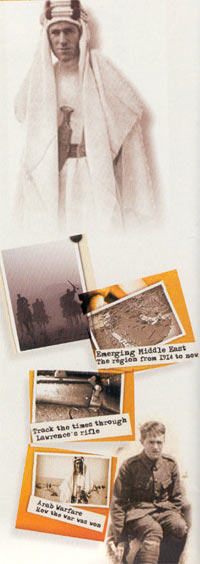
His ancestors were among the oldest
families in Britain. The Lawrences had distinguished
themselves as soldiers since age-old times. One of them
had fought under Richard Coeur de Lion. Another had
become famous for his gallantry in the Indian War of
Independence fought in 1857. They had all been daring
men, eager to seek adventure in different corners of the
world.
Thomas Edward Lawrence lived in his
ancestral home in County Galway on the West Coast of
Ireland. He was the second youngest among his five
brothers. At early age he had an opportunity to travel
with his family to Channel Islands and from there to
Scotland. After studying for three years in a school in
France, he had returned back to England and settled down
in Oxford.
His love for adventure remained
steady during his college years. He explored an
underground stream that flowed under Oxford by lying
flat in his canoe and guiding himself in the darkness
with a bicycle oil lamp. He loved climbing over the
dangerously steep roofs of high-rise buildings. One such
misadventure had kept him confined to a bed for weeks
with a broken leg. At the same time, he read voraciously
and his favourite books were Greek Poetry and studying
the military campaigns of the great generals in the
historic past.
The Middle East fascinated him. Soon
after settling in Oxford, he told his family about his
intention to travel to Arab lands and his first
destination was Syria. His family had purchased for
Lawrence a berth on a steamer and gave him two hundred
pounds to make his travel easier. Reaching Beirut,
Lawrence went into the nearest bank and deposited one
hundred and fifty pounds with the cashier, promising him
to come back for it later.
Lawrence then went to the local
Bazaar. He bought an Arab costume, traded his English
shoes for the native sandals of the people of the desert
and disappeared into the wild interiors of the Syria
bordering the land of Arabia. For two years, he lived
with the Arab tribes, eating their food, sleeping in
their villages, drinking coffee with the tribal chiefs
and braved the harsh desert climate with them. He would
sit by the fireside listening eagerly to the experiences
of the Bedouins and learning from their wisdom. At the
end of his stay, he had returned to Beirut, collected
his money from the bank and returned to Oxford with one
hundred pounds still left on him!
Three months later, he was back in
the Middle East-this time he accompanied a renowned
archaeologist from Oxford, Professor Woolley. Lawrence
was just twenty years old, and tremendously interested
in archaeology. Professor Woolley had noticed the
interest of the young man and offered him the job of
managing the Arab workmen at the site of an excavation
of a prehistoric city on the bank of the old Euphrates
River. Lawrence had gladly accepted.
Being able to speak fluent Arabic,
Lawrence was liked by the Arab workmen almost
immediately. They soon realized that the young man was
full of extraordinary wisdom, in spite of his boyish
face and youthful appearance. Within a few weeks he had
gained their trust so much, that the village elders were
inviting him to their council to judge legal cases!
Strangely, they never argued against his clever
decisions.
Lawrence always dressed in Arab
clothes. His command over the Arabic language and the
mannerisms of the Arabs was so perfect that it had won
him their respect and he was treated as one of them.
Lawrence was always careful never to offend them by
breaking their elaborate rules of etiquette.
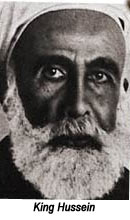
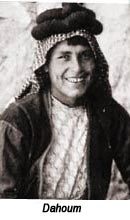
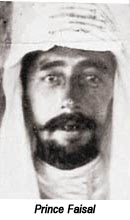
He trusted his workmen completely.
Visitors to his camp would always be shocked to see a
battered trunk of silver coinage, lying open in the
flimsy office. Lawrence would dip into it often to pay
off their wages. Near to the site of the excavation, a
team of German Engineers was constructing a large steel
bridge across the Euphrates. One of the Germans took a
strong dislike to a young Arab hanging with his workmen.
Enraged, he ordered the Arab whipped.
The Arab was one of Lawrence's
servants. That evening, Lawrence walked into the German
Camp and firmly demanded that the junior engineer
apologize to his servant. The German chief engineer was
amazed. Beating the servants was a matter of routine in
his camp. To him, one beating more or less was not
important.
But on seeing the determined look on
Lawrence's face, the German relented. The apology was
made and Lawrence's popularity among the villagers grew.
Soon after this incident the Germans
managed to infuriate the Arab workmen working under
them. The Arabs mutinied and surrounded the German
engineers armed with stones, knives, hammers and clubs.
The Germans locked themselves in their offices with
rifles loaded and their pistols cocked aiming them at
the Arab workmen surrounding their camp. Trouble would
start within a very short time.
The news reached Lawrence.
Accompanied by Professor Woolley, he rushed to the spot.
He talked to the angry Arabs, joked with them, and
quoted a few passages from the Holy Qur'an that spoke
about the virtues of forgiving the wrongdoers. He
managed to soothe their frayed tempers. For this act of
bravery, he was received an award from the Turkish
Government to whom the bridge belonged.
The First World War was fully
underway and Lawrence continued to dig around the ruins
of the city on the bank of the River Euphrates. The high
Commanders in the British Military learned about his
knowledge of old caravan routes in Palestine, Iraq and
Arabia. They also knew that he spoke Arabic fluently and
was familiar with the Arab deserts as most Englishmen
were with their tea gardens. Lawrence would be a great
source of help to the British Army planning to attack
Turkey and he was asked to report to Cairo.
Commissioned immediately to the rank
of a lieutenant, Lawrence was soon advising the military
planners about the best desert routes they could follow
during their military campaign.
Turkey had held the land of Arabia
for the past four hundred years. The Turks had stationed
garrisons of soldiers in strong forts all over the land,
guarding desert towns and they had been put on high
alert to be ready for battle along the eastern coast of
the Red Sea with the British troops in Egypt.
The British high commanders in Cairo
ware worried. They brainstormed to find out a way to
attack the Turks, but Lawrence always vetoed their
plans. He would always give excellent reasons why their
plans would not work in the land of Arabia. Pointing to
the map, he would tell them about the loose sand along a
particular route where their wheeled vehicles would get
stuck. During other sessions he would tell them about
the harbours where the entrances were silted up making
the passage of supply ships impossible in water, which
was only a couple of feet high inside the harbour walls.
A whole year went past without any action and the
generals began to grumble about Lieutenant Lawrence.
The desert Arabs had always hated
the Turkish occupation of their land and they had
revolted against the Turks under the command of Amir
Hussain and his son Amir Faisal in June 1915. Many of
the Bedouin tribes living in the Red Sea Coast from
Makkah to Sinai had joined the rebellion with their
rusty rifles and racing camels, but they were beaten off
with disastrous losses in the city of Madinah.
The Arab warriors were running short
of ammunition and Amir Faisal appealed to the British
forces in Cairo for help.
The British Commanders in Cairo
reacted swiftly. They sent Lawrence at the head of a
large caravan of camels carrying a load of excellent
army rifles and thousands of rounds of ammunition.
Lawrence, leading the caravan rode his camel like a true
son of the desert. Soon after his arrival, he was
invited into Amir Faisal's tent.
"My name is Lawrence," he said
introducing himself to Faisal. "Perhaps, I may be able
to assist your Highness in various small matters."
Faisal was a shrewd leader and an
excellent judge of men. For a moment, he gazed into the
visitor's wonderfully clear blue eyes and liked what he
saw.
"All Praise be to Allah", he said, "
I see that you have great wisdom in your head. You shall
stay with me and presently we will talk together of many
things."
In the meantime, the Turkish army
was on the move. Guns, men and ammunition along with
airplanes, heavy cannons and armoured cars were headed
towards Madinah to launch a final assault against the
Arab rebels. Faisal's lightly armed and untrained men on
camels would not stand a chance against the modern
equipment of a disciplined Turkish army.
Lawrence, however, had other ideas.
"A hawk can slay a small bird", he
said to Faisal, "but small birds in company can drive a
fierce enemy away. We cannot fight the Turks in an open
battle, but we can strike and escape, and strike again."
Lawrence organized a small striking
force. He handpicked a number of Arabs known for their
daring and fighting skills. After arming them with
rifles and ammunition, he placed himself at their head.
Riding on their camels, they ventured deep, into the
desert, each among them carrying their own supplies.
Soon they were attacking the Turkish garrisons in small
isolated towns and in a matter of weeks a number of
small ports along the Red Sea coast were under their
control.
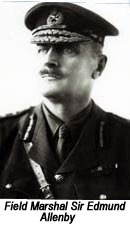
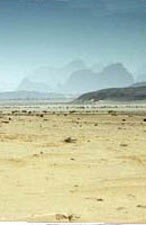
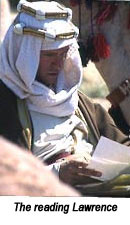
News of his victories travelled with
surprising rapidity across the desert of Arabia. Strange
stories were now being told in lonely Bedouin camps
about a strange young man, but one who spoke Arabic like
the Faithful was leading the Arab warriors to victory.
From far across the deserts, fresh bands of young
fighting Arabs started heading towards Amir Faisal's
camp and soon, there were thousands of new recruits
eager to liberate Arabia from the burden of Turkish
occupation.
The Turks and Germans learned
quickly that the Arabs had a new leader, who has led
them on a raid on the tiny seaport town of Aqabah in a
manner that indicated careful military preparations. A
reward of 50.000 pounds was offered to capture Lawrence
dead or alive. When Lawrence heard that, he smiled. It
was the best proof that his plans ware hurting the
Turkish government.
After the fall of Aqabah, Lawrence
led his raiding army northwards across the desert and he
had decided to target the Turkish railway lines that ran
northwards through Palestine, Syria and Turkey from the
Arabian Desert. The trains had carried men and the
weapons of war to fortify the Turkish garrisons on the
route to Madinah. During his stay in Arabia, Lawrence
blew up trains, bridges, embankments and lengths of
track on seventy-nine different occasions.
To the north of the Aqabah seaport
was the wonderful old city of Petra, surrounded by
towering sharp-ridged mountains, from which a single
rocky trail that led to the railway town of Maan, some
twenty-five miles away. The Turks decided to occupy
Petra and use it as a base to recapture Aqabah.
Lawrence saw a wonderful opportunity
to ambush the advancing troops marching along the trail
from the surrounding mountains of Petra. Unfortunately,
he had only a couple of hundred men under his command.
Many more would be needed to make the ambush a complete
success. He rode of on his camel to visit the nearby
villages exhorting the Bedouins to fight on his side and
they responded eagerly to his call.
The ambush that followed was a complete success. Turkish
fighter and bomber planes flew over the mountaintops,
machine gunning and bombing continuously at the Arabs.
But, so well were the Arabs hidden that the losses
suffered by them were very small. The Turco-German force
was utterly defeated and lost all their machine guns and
armoured cars. However, a thousand among them survived
and succeeded in fighting their way back to Maan.
Amid the ambushes and train wrecking
adventures, Lawrence worked as a spy behind the enemy
lines. He entered the Turkish held towns disguised as an
Arab and collected valuable military secrets, which were
promptly, dispatched to Field Marshal Allenby, the
Commander of the British troops in the Middle East.
During one such spying mission, Lawrence was arrested by
a Turkish military patrol believing him to be one of the
deserters from their own army. He was taken to the
nearby barracks and thrashed with a heavy leather whip
until he fainted. The Turks then threw him into a dusty
street where Lawrence managed to pick himself up and
stumble out of town.
In the autumn of 1917, General
Allenby's troops marched through Palestine. Its right
flank was made up of Lawrence's Arabs: two hundred and
fifty thousand of them, the world's finest desert
fighters. Throughout the summer of 1918, the army rolled
on capturing the enemy's depots and garrisons. Until the
final collapse of the Turkish armies, Lawrence continued
to operate behind Turkish army lines sabotaging their
supply lines. His existence among the Arabs came to an
end with the Armistice. Quietly, he left Arabia for
Cairo, and from there he made his way to England.
Soon, the nation came to know about
his exploits in the desert and everyone in Britain
wanted to know about the extraordinary young man.
However, Lawrence was publicity shy and refused almost
all invitations and retired into the privacy of his home
in the Epping Forest. His longing for anonymity made him
join the Royal Air Force with a very modest rank and an
assumed name.
Apart from his love for books,
archaeology, and ancient poetry, Lawrence was fascinated
by speed. He had bought a powerful motorbike, which he
drove fiercely in the countryside. One Sunday morning he
had a fatal accident and died in a hospital on 19 May
1935 as a result of his injuries.
The life and career of Lawrence of
Arabia had come to an end. But he continues to live with
the millions of his readers, fascinated by his
adventures in the Arabian deserts, through his books and
will always remain as a source of inspiration to
adventure seekers all over the world.
| 